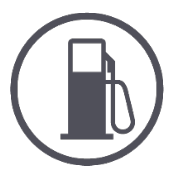BASE OIL
BASE 150 AND BASE 600.
Base oils are used to manufacture products including lubricating greases, motor oil and metal processing fluids. Different products require different compositions and properties in the oil. One of the most important factors is the liquid’s viscosity at various temperatures. Whether or not a crude oil is suitable to be made into a base oil is determined by the concentration of base oil molecules as well as how easily these can be extracted.
Base oil is produced by means of refining crude oil. This means that the crude oil is heated in order that various distillates can be separated from one another. During the heating process, light and heavy hydrocarbons are separated – the light ones can be refined to make petrol and other fuels, while the heavier ones are suitable for bitumen and base oils.
BITUMEN
PETROLEUM BITUMEN 60/70, 80/100, 30/40.
Bitumen refers to an oil-based non crystalline solid substance produced naturally or from crude oil refining. Bitumen is mostly composed of highly condensed polycyclic aromatic hydrocarbons. After refining, Bitumen is the more viscous, heaviest and thickest petroleum derivative.
FUEL OIL
CST 180, 280,380 – ALL TYPES OF FUEL OILS.
Fuel oil is defined as any liquid that is burned in furnaces, boilers or used in a power generation engines. Fuel oil is obtained from distilled crude oil having a flash-point of approximately 40 ° C. According to this definition, diesel is a type of fuel oil. Fuel oil is composed of long hydrocarbon chains, particularly alkanes, cycloalkanes and aromatics and placed in the classification of heavy industrial fuels, heavier than gas-oil and Naphtha.
GAS OIL
AUTOMOTIVE GAS OIL.
Automotive Gas Oil, or AGO, is the name given to fuel intended for use in road vehicles (trucks, buses, vans and cars) powered by diesel engines. The fuel is obtained in the mid-boiling range from the distillation and processing of crude oil.
Related fuels, such as Industrial Gas Oils (IGOs), which are used for non-road applications including off-road diesel engines, are obtained from the same fraction of the crude oil barrel. While Automotive Gas Oil is the technical name used by the oil industry, automotive diesel fuel,or just plain ‘diesel’, are the more common and widespread names used by the consumer. ‘Middle Distillates’ is the generic oil industry name for gasoils, including both AGO and IGO.
GASOLINE
Leaded and Unleaded Gasoline.
Gasoline, also spelled gasolene, also called gas or petrol, mixture of volatile, flammable liquid hydrocarbons derived from petroleum and used as fuel for internal-combustion engines. It is also used as a solvent for oils and fats. Originally a by-product of the petroleum industry (kerosene being the principal product), gasoline became the preferred automobile fuel because of its high energy of combustion and capacity to mix readily with air in a carburetor.
LNG
LIQUEFIED NATURAL GAS.
LNG is a clear, colourless and non-toxic liquid which forms when natural gas is cooled to -162ºC (-260ºF). The cooling process shrinks the volume of the gas 600 times, making it easier and safer to store and ship. In its liquid state, LNG will not ignite.
When LNG reaches its destination, it is turned back into a gas at regasification plants. It is then piped to homes, businesses and industries where it is burnt for heat or to generate electricity. LNG is now also emerging as a cost-competitive and cleaner transport fuel, especially for shipping and heavy-duty road transport.
LPG
LIQUEFIED PETROLEUM GAS.
Liquefied petroleum gas (LPG ) is a clean-burning hydrocarbon gas in liquid form that may be Propane or Butane or a mixture of the two. It is a very versatile fuel, extensively used for space heating, cooking and catering, refrigeration, caravans, homes on metered estates, BBQs, industrial processes and heating, powering fork-lift trucks and vehicles, farming applications and, in its purest form, as an aerosol propellant.
LPG is produced as a by-product in oil refining and is also extracted from naturally-occurring sources. It exists as a gas at normal atmospheric pressure, taking liquid form only at very low temperatures or when put under further pressure.
LUBRICANT
Petrol engine oil, Diesel engine oil, Gear Oils.
Typically lubricants contain 90% base oil (most often petroleum fractions, called mineral oils) and less than 10% additives. Vegetable oils or synthetic liquids such as hydrogenated polyolefins, esters, silicones, fluorocarbons and many others are sometimes used as base oils.







